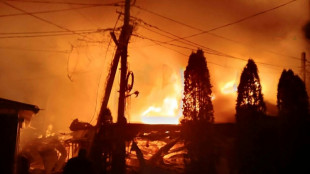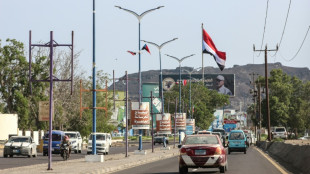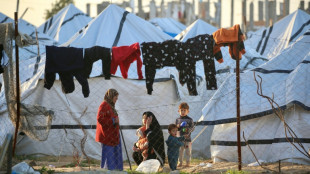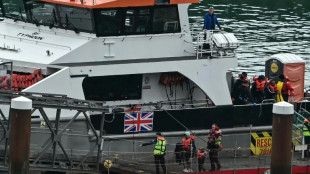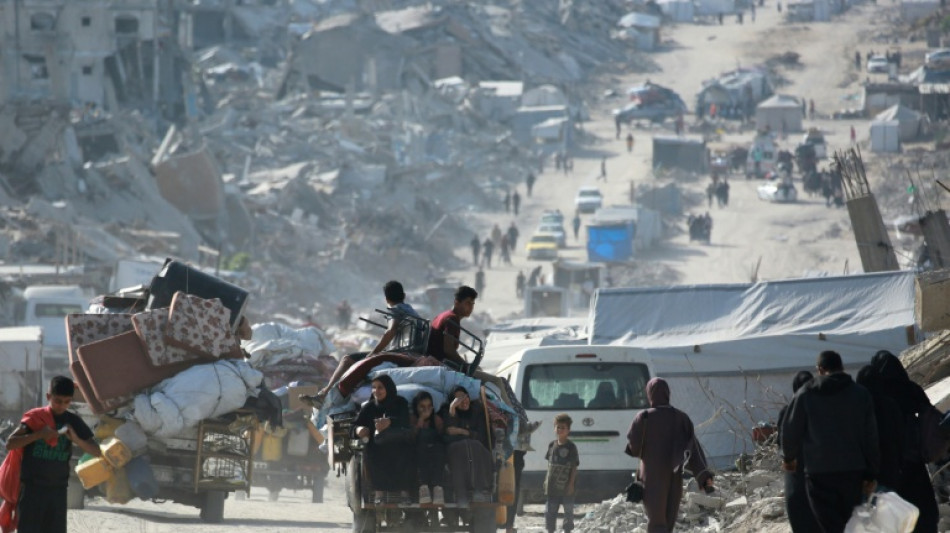
| SCS | 0.12% | 16.14 | $ | |
| NGG | -0.54% | 77.35 | $ | |
| RBGPF | -0.37% | 80.75 | $ | |
| GSK | -0.53% | 49.04 | $ | |
| CMSC | -0.15% | 22.65 | $ | |
| CMSD | 0.09% | 23.15 | $ | |
| AZN | -0.63% | 91.93 | $ | |
| RELX | -1.71% | 40.42 | $ | |
| BCE | 1.05% | 23.82 | $ | |
| RIO | -0.61% | 80.03 | $ | |
| BTI | 0.12% | 56.62 | $ | |
| JRI | 0.22% | 13.61 | $ | |
| VOD | -0.15% | 13.21 | $ | |
| BCC | -0.26% | 73.6 | $ | |
| RYCEF | 0.13% | 15.51 | $ | |
| BP | -0.06% | 34.73 | $ |
European nations increase pressure on Israel to stop broad Gaza offensive

European countries ramped up pressure on Israel to abandon its intensified campaign in Gaza and let more aid into the war-ravaged territory, where rescuers said fresh attacks killed dozens of people on Tuesday.
An AFP journalist saw five trucks entering the Kerem Shalom crossing into Gaza from the Israeli side on Tuesday, a day after the UN said it had been cleared to send aid for the first time since Israel imposed a total blockade on March 2, sparking severe shortages of food and medicine.
The dire humanitarian situation in the Strip has prompted an international outcry, with Sweden saying it would press the European Union to level sanctions against Israeli ministers.
"Since we do not see a clear improvement for the civilians in Gaza, we need to raise the tone further," Swedish Foreign Minister Maria Malmer Stenergard said Tuesday.
Elsewhere, Britain suspended free-trade negotiations with Israel, summoned the Israeli ambassador and said it was imposing sanctions on settlers in the occupied West Bank in its toughest actions so far against Israel's conduct of the war.
"The world is judging, history will judge them," Foreign Secretary David Lammy said in an impassioned speech to parliament. "Blocking aid, expanding the war, dismissing the concerns of your friends and partners. This is indefensible and it must stop."
Responding to Britain's moves, Israeli foreign ministry spokesman Oren Marmorstein said "external pressure will not divert Israel from its path in defending its existence and security".
Britain, along with Canada and France, had previously warned of "concrete actions" if Israel did not ease its offensive and allow more aid in.
A spokesman said on Tuesday that the UN had received permission to send "around 100" trucks of aid into Gaza after nine were authorised the day before.
UN humanitarian chief Tom Fletcher said that the trucks allowed in on Monday were "a drop in the ocean of what is urgently needed".
Fletcher told the BBC on Tuesday that 14,000 babies could die in the next 48 hours if aid did not reach them in time.
Marmorstein told AFP that aid was "making its way to Gaza as we speak", adding "dozens of aid trucks" were expected on Tuesday.
- 'Children who were sleeping' -
The Israeli army stepped up its offensive at the weekend, vowing to defeat Gaza rulers Hamas, whose October 7, 2023 attack on Israel triggered the war.
Strikes overnight and early Tuesday left "44 dead, mostly children and women, as well as dozens of wounded", civil defence spokesman Mahmud Bassal told AFP.
Bassal said 15 people were killed when a gas station was hit near the Nuseirat refugee camp and 12 others in a strike on a house in Deir el-Balah, both in central Gaza.
Eight people were killed in a strike on a school sheltering displaced Palestinians in Gaza City, further north, he added.
The Israeli military told AFP it had "struck a Hamas terrorist who was operating from within a command and control centre" inside the school compound. There was no comment on the other incidents.
At the bombarded gas station, Nuseirat resident Mahmoud al-Louh carried a cloth bag of body parts to a vehicle.
"They are civilians, children who were sleeping. What was their fault?" he told AFP.
In a statement on Tuesday, the military said it had carried out strikes on more than "100 terror targets" in Gaza over the past day.
- 'Irresponsible' behaviour -
On Monday, Prime Minister Benjamin Netanyahu said Israel would "take control of all the territory of the Strip" with its new campaign, which one official has said would include the "conquest" of Gaza and the displacement of its population.
The prime minister said it was necessary for Israel to allow aid into the territory for "practical and diplomatic reasons", as "images of mass starvation" could harm the legitimacy of the war effort.
Israel resumed operations across Gaza on March 18, bringing an end to a two-month ceasefire amid deadlock over how to proceed.
Negotiators from Israel and Hamas began a new round of indirect talks in Doha over the weekend aimed at securing a new agreement.
But Qatar, which has been involved in mediation efforts throughout the war, said on Tuesday that Israel's offensive had undermined the chances of a ceasefire.
"This irresponsible, aggressive behaviour undermines any potential chance for peace," Qatari Prime Minister Sheikh Mohammed bin Abdulrahman bin Jassim Al-Thani said.
A source close to Hamas alleged on Tuesday that Israel's delegation "has not held any real negotiations since last Sunday".
"Negotiations are currently stalled due to Netanyahu's systematic policy of obstruction and the disruption of any opportunity to move towards an agreement on prisoner exchange and a ceasefire," the source told AFP, adding the "US administration has not exerted sufficient pressure" on Israel.
The Hamas attack in October 2023 resulted in the deaths of 1,218 people on the Israeli side, mostly civilians, according to an AFP tally based on official figures.
Militants also took 251 hostages, 57 of whom remain in Gaza including 34 the military says are dead.
Gaza's health ministry said Tuesday at least 3,427 people have been killed since Israel resumed strikes on March 18, taking the war's overall toll to 53,573.
U.Krajewski--GL

 London
London

 Manchester
Manchester
 Glasgow
Glasgow
 Dublin
Dublin
 Belfast
Belfast
 Washington
Washington
 Denver
Denver
 Atlanta
Atlanta
 Dallas
Dallas
 Houston Texas
Houston Texas
 New Orleans
New Orleans
 El Paso
El Paso
 Phoenix
Phoenix
 Los Angeles
Los Angeles
